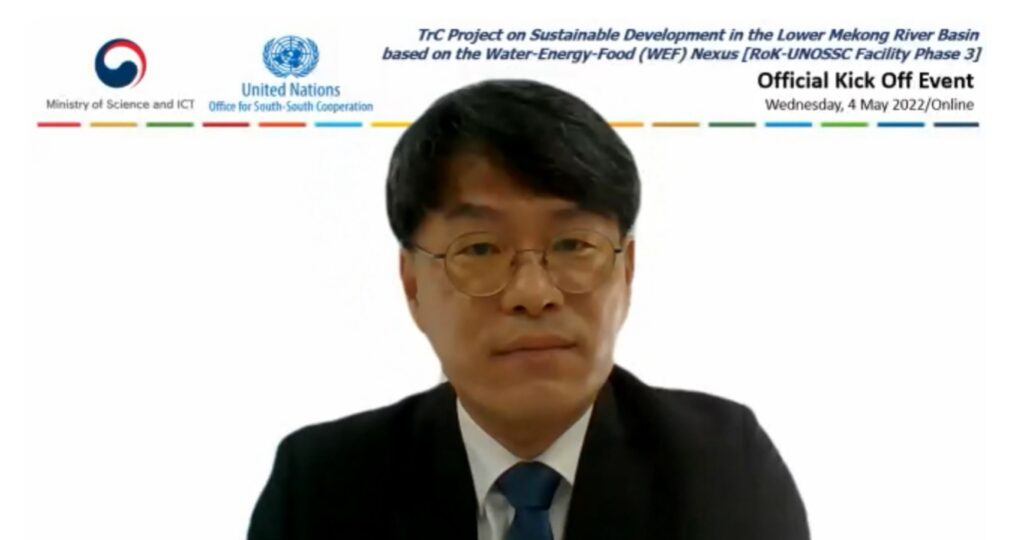Official Kick-off Project in the Lower Mekong Basin to strengthen access to water, food and energy for vulnerable communities living in the Lower Mekong Basin (Cambodia, Lao PDR, Thailand, and Viet Nam).
4 May 2022: The United Nations Office for South-South Cooperation (UNOSSC), the Ministry of Science and ICT (MSIT) of the Republic of Korea and the Mekong River Commission (MRC) have officially kicked off the implementation phase of their joint project, Triangular Cooperation on Sustainable Development in the Lower Mekong Basin based on the Water-Energy-Food (WEF) Nexus (RoK-UNOSSC Facility Phase 3). The virtual event brought together the main stakeholders and implementing parties, including the MRC Secretariat, the Mekong Institute (MI) and the Science and Technology Policy Institute (STEPI) of the Republic of Korea.
Although the project document was signed in September 2021, the kick-off meeting was a milestone to celebrate a successful collaboration, evidenced by the number of decisions already made together to increase the efficacy and sustainability of the project. The event was also intended to strengthen the understanding of the respective roles of the participating stakeholders. The participants agreed to work towards a first stakeholder consultative meeting in June 2022, which will bring together a broader profile of stakeholders to ensure that all voices are heard in the implementation of the project. The occasion also served as a platform to reaffirm the commitment of all partners to continue to support people in the Lower Mekong Basin, strengthen multi-stakeholder partnerships, and increase project visibility.

Mr. Adel Abdellatif, UNOSSC Director a.i., delivered his statement of appreciation to the other partners.
Mr. Adel Abdellatif, Director a.i. of UNOSSC, expressed his deepest appreciation to the Government of Republic of Korea (Ministry of Science and ICT), the Mekong River Commission (MRC) and its Secretariat. He also commended the dedication of the Republic of Korea and the countries represented by the MRC to uphold a strong focus on helping people in the Lower Mekong Basin “through science, technology and innovation (STI) towards mitigating the impacts of climate change and development activities that have triggered challenges to people’s livelihoods, the environment they live in, and in particular, women and the vulnerable.”

Mr. Seong Gyu Kim, Director-General, International Cooperation Bureau, MSIT offered congratulatory remarks.
Mr. Seong Gyu Kim, Director-General of the International Cooperation Bureau at the Ministry of Science and Technology (MSIT) of the Republic of Korea congratulated the participants and emphasized the support of the Republic of Korea to the participatory and inclusive STI partnership through South-South and triangular cooperation that characterized this project. Highlighting the Republic of Korea’s ongoing cooperation with Mekong countries and the UNOSSC, he expressed his country’s strong will to actively share its science and technology know-how and experience. He added that the RoK will continue to endeavour to match high-demand priorities in the Mekong region. He requested partner countries’ full support and ownership of the project to achieve sustainable outcomes.

Dr. Anoulak Kittikhoun, Chief Executive Officer, MRC Secretariat, welcomed the various parties on behalf of the Mekong Riparian countries.
Dr. Anoulak Kittikhoun, Chief Executive Officer of the MRC Secretariat, addressed some of the unprecedented challenges faced by “a basin of one of the world’s greatest rivers” – the Mekong basin, including loss of wetlands, reduced sediments nourishment, and rising salinity that is increasingly impeding rice cultivation. He noted that these adverse impacts have been coupled with the COVID-19 pandemic, natural disasters, climate change and human activities that are creating hardship for millions of vulnerable fishing and farming families. Dr. Kittikhoun added, “This project has a special significance as it will help the riparian countries address key societal challenges such as access to energy, affordable food, and clean water.” He restated MRC’s support of the project and stated his vision for its implementation. “Reinforcing cooperation on these challenges will be done through stakeholder engagement, capacity building, brokerage on research and innovation, monitoring, support to policy, and institutional synergies to back up long-lasting and sustainable cooperation,” he said.
Three implementing parties, namely, MRCS, MI and STEPI reaffirmed their commitment and support to the project. The kick-off event was followed by the First Steering Committee meeting under the project. The project stakeholders will meet again in the First Stakeholder Consultative Meeting with representatives from the four member states on the last week of June 2022.

About the RoK-UNOSSC Facility Phase 3
The “Triangular Cooperation Project on Sustainable Development in the Lower Mekong River Basin based on the Water-Energy-Food (WEF) Nexus” (2021-2025) aims to strengthen access to water, food and energy for vulnerable communities living in the Lower Mekong Basin (Cambodia, Lao PDR, Thailand, and Viet Nam) through strengthening development approaches and management in these sectors. It will take integrative and multi-sectoral approaches in application of highly demanded technologies on water, energy and food to improve the livelihoods of the people based on South-South and triangular cooperation modalities. The 5-year project is supported by the Ministry of Science and ICT, Republic of Korea, and the UN Office for South-South Cooperation (UNOSSC) leads the project in partnership with other institutions including the Mekong River Commission Secretariat (MRCS), Mekong Institute (MI) and the Science and Technology Policy Institute (STEPI) and will enlist the help of other UN Agencies.
